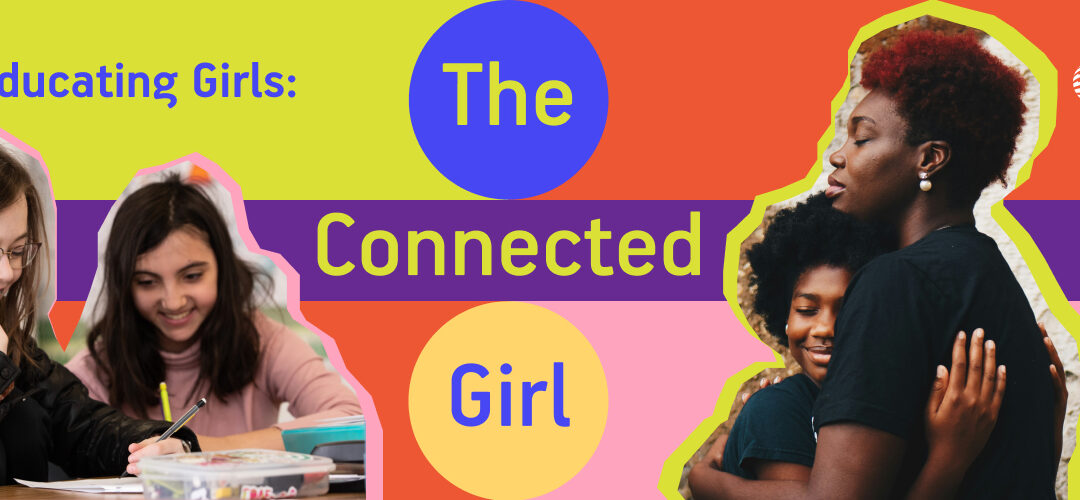Rosemont and The International Coalition of Girls’ Schools are proud to present The Connected Girl, a compelling six-episode On Educating Girls podcast series that offers expert insights into important aspects of girls’ healthy development in a world that can often feel disjointed. We will add each podcast to this post as it is published.
Connection often begins with an invitation. The Connected Girl is an invitation to those who know, love, and believe in empowering girls to engage with the experts we have gathered to understand the power and possibility of the many connections in the lives of girls.
Series Trailer:
Episode 1:
Forging Powerful Relationships
with Dr. Tori Cordiano
“What we know is that strong, powerful relationships with trusted adults are a protective factor for girls at all levels of development.”
—Dr. Tori Cordiano
Girls love to be connected; they are all about relationships, connections in both real and symbolic ways with the world and everything in it. Girls have relationships with peers, with food, with their bodies, with nature, with music, with exercise, with their social media, and with their voices. For girls, the proactive management of all these connections is critical to their sense of wellbeing. It is through healthy relationships that girls feel connected to all that makes them whole. As importantly, the reverse of this is also true: when girls are disconnected from their peers, from their bodies, from caring adults, from nature, from sleep—they feel afloat, untethered, vulnerable, less than. In this first episode of The Connected Girl series, you are invited into a conversation that explores what we know for sure about the power of healthy—and unhealthy—connections in the lives of the girls.
To launch this important journey, join Dr. Tori Cordiano, a consulting psychologist and the director of research at Laurel School’s Center for Research on Girls in Shaker Heights, Ohio, and On Educating Girls podcast host Trudy Hall as they unpack critical terms and demystify the language and the realities of connection and disconnection for girls. This episode lays the groundwork for a six-episode series that has been curated with girls at the center, and includes the voices of girls themselves, sharing their insights about the connections in their lives.
Resources:
- Episode Transcript
- Laurel School’s Center for Research on Girls
- Wycombe High TV
- Tell Our Story, The ICGS Community Poem
Episode 2:
Connecting with Parents
with Dr. Judith Locke
“To have a good relationship with your child is extremely important, but not such a good relationship that you are describing your child as your best friend.”
—Dr. Judith Locke
Is there any relationship, any connection, more vital, more critical in a young girl’s life than the one she has with her parents on the journey from girlhood to womanhood? At the same time, is there any connection more fraught and fragile? Parenting a girl as she moves along the developmental path from dependence to independence is not a job for the faint of heart. There has never been a time when so much guidance has been available to parents, yet neither has there ever been a time when parents have struggled more to get parenting “right,” if there even is such a thing. This episode of The Connected Girl embraces the topic of maintaining a healthy connection to a girl as she becomes her own person, walking in the world in ways that are sometimes hard for parents to understand, making mistakes and choices that make her parents shake their heads and make her roll her eyes.
Listen in as host Trudy Hall invites Dr. Judith Locke, a clinical psychologist and researcher from Australia, and the author of The Bonsai Child and The Bonsai Student, to share her theory about modern parenting. She posits that even though parents are spending more time than ever parenting their children, the self-esteem and resilience in their children is not reflecting that investment. What gives? Dr. Locke has a theory that makes a great deal of sense and some advice to go along with it. The girls’ voices you will hear give heartwarming testimony to the reality that girls truly want and need their parents in their lives.
Resources:
Episode 3:
Setting Healthy Boundaries
with Elizabeth Zeigler
“We need to work with our young people to help them understand what consent means.”
—Elizabeth Zeigler
Unfortunately, the statistics tell us why having the hard conversations with girls about consent and violations of personal space is vital: In The States, one in five middle school students have experienced unwanted sexual contact; one in 20 girls have changed schools due to sexual harassment; one in four women have experienced some form of sexual violence before college. The reality is that by the time students finish their education, 81 percent will have experienced some type of sexual harassment. This is a conversation that we may not want to have, but girls need for us to have it. This episode of The Connected Girl coaches adults on how to be proactive, and it also offers guidance as to what to do if the girl in your life is feeling unsafe due to some sort of harassment.
Join host Trudy Hall as she learns from Elizabeth Zeigler, the former Executive Director of I Have The Right To, a nonprofit organization dedicated to being a hub for students, parents, and educators as they search for resources and support to address sexual harassment and sexual assault. Elizabeth, also the founder of the coaching firm Claremont, is an experienced CEO who is committed to ensuring respectful cultures. She believes that no one needs to be facing serious challenges without a network of support. This conversation is all about the criticality of girls respecting themselves as they confront challenges to the things that are most important to them: their feelings of safety, their personal boundaries, and their bodies.
Resources:
Episode 4:
Handling Heartbreak
with Angela Terpstra
What we know for sure is that at some point, the girls in our life will grieve a loss in their family, in their school or church community, in their world. It might be a break-up with a first true love, a move away from friends, the loss of an adored pet, a parents’ divorce, the loss of a safe relationship, or worse—the death of a loved one—and might likely be a loss of a relationship that sustained her through thick and thin. She will be heartbroken. Walking the path of sorrow and sadness with her can break our hearts, too. Every type of grief is different, and every one of us grieves differently. There is no grief handbook, but that is not a reason to dodge this important conversation.
Listen in as Angela Terpstra, the Head of School at Bishop Strachan School in Canada, shares her compelling story of leading her school community through several significant losses. It is in the times of deepest loss that we lean heaviest into the communities that know and support us. Angela’s story inspires even as it reminds us why connecting a girl to her grief and supporting her as she walks with grief can help her shape and reframe the many and varied emotions that will flow from that loss.
Resources:
Episode 5:
Navigating Life Online
with Laura Tierney
“Social media is a tool. If people aren’t equipped to navigate it positively, you are going to see negative consequences like anxiety and depression. … I liken social media to giving students the key to a car …”
—Laura Tierney
For better or for worse, the girls in our lives “do” social media; they are “connected” to TikTok, Snapchat, Instagram, and more. In fact, recent reports tell us that 98 percent of the teenage girls surveyed used social media daily, spending about two hours on average—on average—specifically on well-known social media apps. Yet, the truth is that girls are conflicted about their relationship with social media. Many use the word “addicted,” aware they are wasting time scrolling, but they find social media to be essential for creative inspiration, relaxation, and connectivity. Frankly, they already know that social media plays both positive and negative roles in their lives. Clearly, it is a powerful influencer, but adults can proactively help girls manage their connection to social media so that their social media use doesn’t manage them.
In this episode of The Connected Girl, host Trudy Hall invites Laura Tierney, the Founder and CEO of The Social Institute, to share proactive strategies for negotiating this tricky terrain. The Social Institute has designed a unique approach to help students navigate the possibilities of social media so that it can fuel wellness and future success, showcasing role models and leaning into character strengths such as empathy, integrity and teamwork to inspire students to make good choices with their social media use. She reminds us that we are—and need to be—critical partners with girls in this arena, keeping them connected to their real selves even as they stay connected to their smartphones.
Resources:
Episode 6:
Speaking Your Truth
with Latricia Barksdale
Can there be any connection more vital in a girl’s life than her connection to her voice—her authentic voice? The word “voice” has multiple meanings in the world of girls. Voice is often a term that is used metaphorically to talk about gender equity, implying that to have voice is to have power; to lack voice is to be powerless. We need to remember, however, that every girl already has a voice—a real voice—a voice that she uses every day to negotiate her world. But having that voice is only the beginning; she must learn to find that voice, to use that voice, to own that voice. This episode is about the girls who are on that journey and will need our support, our encouragement, and our modeling, as they are going to need to be brave.
Join host Trudy Hall as she shares a lively conversation with Latricia Barksdale, the Vice President of Lean In Girls, a leadership program that is on a mission to equip girls to be self-assured, resilient, and knowledgeable about the bias they will face in the real world. We live in a world that often sends signals to girls that leadership belongs to others. This conversation reminds us that leadership belongs to them—once they have owned the power of their voice.

